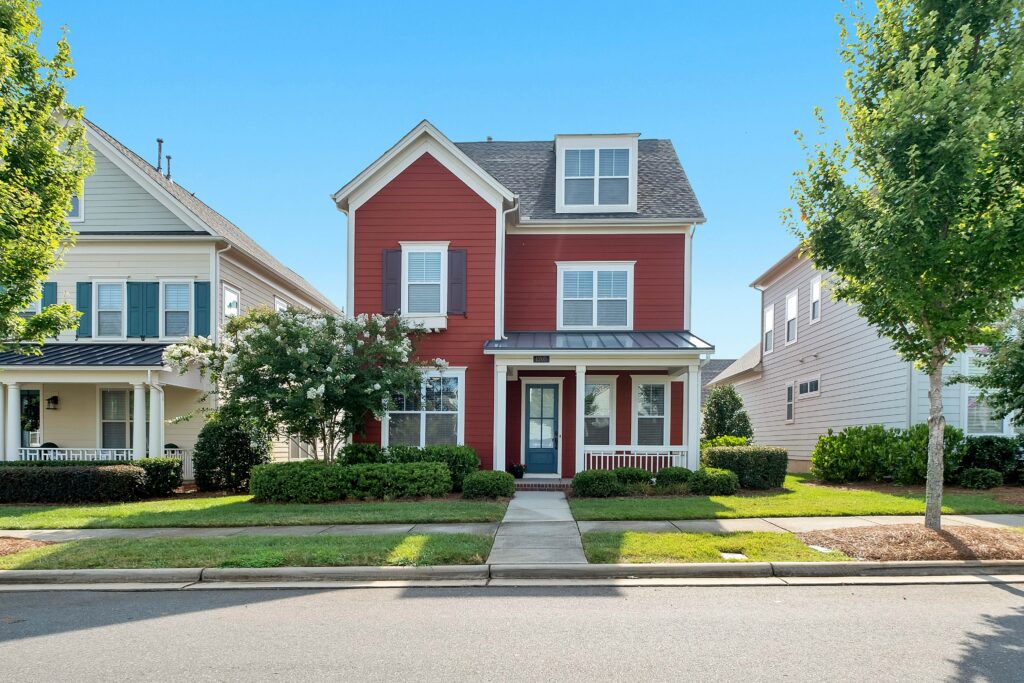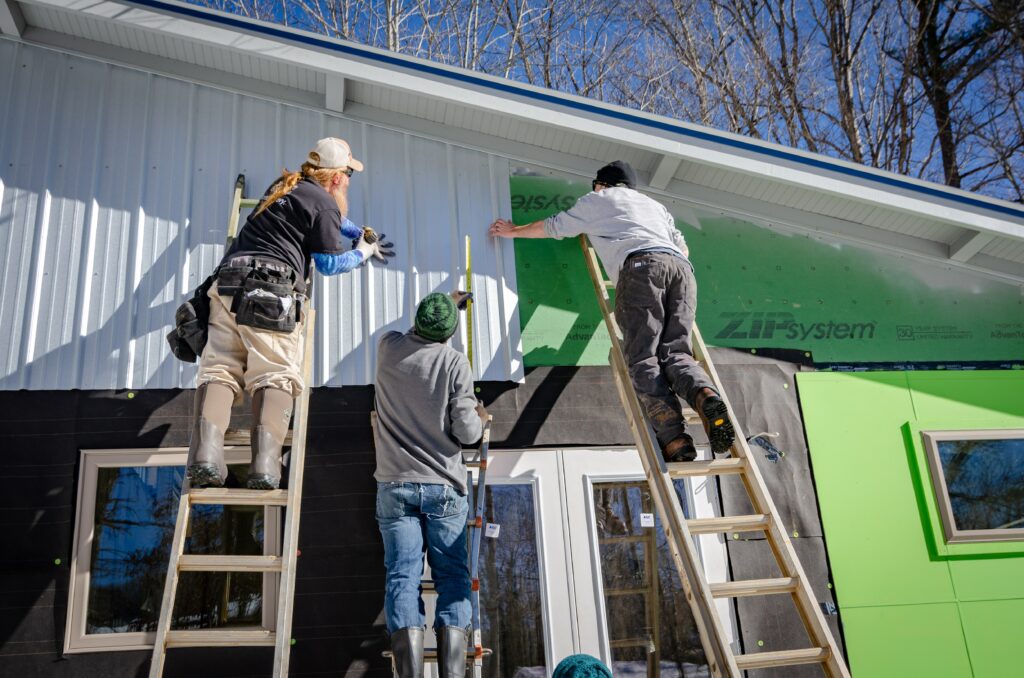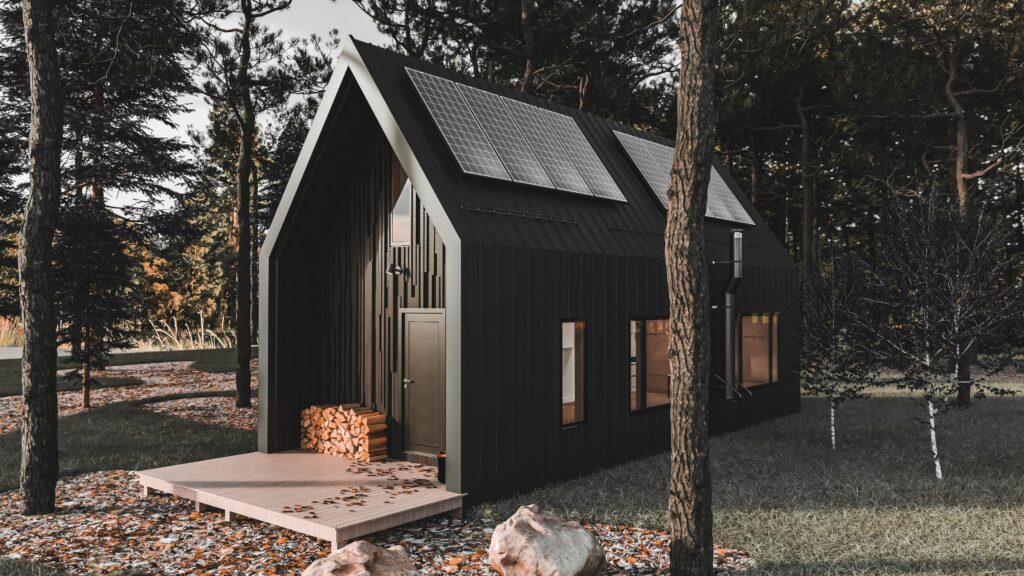Building your ideal home from the ground up seems like a far-off fantasy because housing expenses are always rising. But you’re not alone—according to the National Association of Realtors, the average cost of a newly constructed home in the United States as of June 2023 is over $400,000! That alone should cause anyone to reconsider buying a new house!
But hey, cheer up! There’s a home-buying solution that takes the hassle out of your hands. It comes in the form of prefabricated homes. These homes are the bargain heroes of the housing market – they save the day when the traditional, on-site construction process seems impossible. Among these prefab heroes, two stand out: modular and manufactured homes. We’re here to unravel the mystery and help you make the right financing choice.

Modular Homes
Instead of a construction site, modular homes are built in a factory. Think of them as LEGO sets for grown-ups, with each piece custom-made, but in a controlled environment. In the world of modular homes, the components are pre-built in a factory. Walls, floors, ceilings – all these pieces are created as discrete units called modules. It’s like assembling a jigsaw puzzle off-site, only to bring the finished picture to your chosen plot of land.
So, what’s the cost to your wallet when it comes to modular homes? The base price is rather reasonable, ranging from $40 to $80 per square foot. It goes up to $100-$200 per square foot when you include installation. Finally, considering utilities such as foundation fees, plumbing, and electricity, the additional cost can run anywhere from $3,000 to $20,000.
Pros of Modular Homes
Now, let’s talk about why modular homes are catching the eye of those seeking an alternative to traditional construction.
1. Shorter Construction Time
If patience isn’t your strong suit, you’ll love modular homes. They’re like the sprinters of the housing world. Since these homes are factory-made and then quickly assembled on-site, there’s less room for weather-related or supply-chain delays. No more waiting for the rain to stop before your home can grow!
2. Flexible Customization
One of the perks of modular homes is the ability to unleash your inner architect. Sure, you’ll choose from pre-designed modules, but the variety in style, materials, layouts, and sizes gives you creative freedom. It’s like customizing your very own pizza with all your favorite toppings.
3. Reduced Waste
Waste not, want not! Modular homes are eco-warriors. They generally use less energy and produce less waste compared to traditional stick-built homes. So, you can build your dream home and save the planet at the same time. Now, that’s a win-win!
4. Potentially Better Construction Quality
Worried about quality? Don’t be. Production facilities for modular homes are subject to federal quality controls and standards. It’s like a double-check on the quality assurance checkbox. Who doesn’t love a little extra peace of mind?
Cons of Modular Homes
We’ve raved about the pros, but it’s only fair to discuss the cons as well. Brace yourselves!
1. Customization Limitations
While you can be the master of your modular domain, there’s a catch. You’ll have to work within the range of modules that the manufacturer can produce. So, no unicorns or castles in the sky – there are limits to your creativity.
2. Additional Costs
The base cost may sound appealing, but there’s more to the story. Electrical, plumbing, and ductwork are not typically included in the basic price. You’ll need to open your wallet for these essential home functions. And let’s not forget the foundation, which isn’t free either.
3. Preconceived Prejudices
Ever heard the phrase “don’t judge a book by its cover”? Well, it applies to homes too. Some folks still have outdated beliefs that modular homes are less sturdy and well-constructed than traditional builds. This perception could impact a home’s future appreciation and resale value, even if it’s not true.

Manufactured Homes
Picture a typical factory, but instead of cars or widgets, they’re cranking out homes! Manufactured homes are born in factories, just like modular homes. The difference is that they’re built on a steel chassis, similar to the frame of an automobile, and then transported in one piece to their final destination. It’s like ordering a pizza and having the whole oven delivered to your doorstep.
The features include:
1. Factory-built
If you’re imagining a home on wheels, you’re onto something. Originally called “mobile homes” (hence the wheels), many modern manufactured homes stay put on concrete blocks or metal piers. It’s like having a house that you could decide to pack up and move across town.
2. Cost and Budget Considerations
Let’s talk dollars and cents, or in this case, dollars and square footage. The traditional housing market can be substituted by more reasonably priced manufactured houses. They provide a cost-effective solution, with prices ranging from $100 to $200 per square foot.
The big decision here is whether you’ll own land for your new home or rent a space in a manufactured home park. Owning land comes with perks, but renting has its advantages too. It’s all about what suits your lifestyle and finances.
Pros of Manufactured Homes
Manufactured homes have their charm, and there are several compelling reasons to consider them as your next dwelling.
1. Affordability
Who doesn’t love a good deal? Manufactured homes typically cost at least half of what you’d spend on a traditional new home. That’s some serious money saved for other life adventures, like traveling or spoiling yourself with a fancy coffee every morning.
2. Construction Speed
In the race to move into your new home, manufactured homes are absolute track stars. They’re built much faster than their traditional counterparts. You can go from choosing your home to moving in within a fraction of the time it takes for a site-built home.
3. Easy Maintenance
Manufactured homes often come with manufacturer-offered warranties. And the standardized parts mean that maintenance and repairs can be quick and straightforward. It’s like owning a car under warranty; if something goes wrong, you’re covered.
Cons of Manufactured Homes
As much as we love them, manufactured homes aren’t without their downsides.
1. Less Equity
Unlike conventional construction, prefabricated homes have the tendency to lose value over time, which presents a dilemma. Because of this, purchasers who would want to sell it in a few years may find it less appealing.
2. Financing Limitations
Financing a manufactured home can be a bit trickier. They are typically considered personal property, not real property. So, you might find fewer loan options available for these homes. Imagine trying to pay for a fancy dinner with a gift card – it might not always work.
3. Limited Personalization
When it comes to personalizing your manufactured home, you might have fewer options compared to modular homes. While there are some design choices available, it can be challenging to make major updates or alterations down the road.
4. Location Restrictions
Finally, where you can place a manufactured home may be subject to local regulations. Some areas have restrictions on where these homes can be located, so it’s essential to research your preferred locations before making a decision.
Key Differences: Modular vs Manufactured Homes
Modular and manufactured homes may appear similar, but they have a fundamental difference.
1. Modular Homes – Anchored to a Foundation
Imagine a home that’s like a tree, firmly rooted in the ground. That’s a modular home. It’s anchored to a foundation and isn’t going anywhere unless you decide to pack up and move entirely.
2. Manufactured Homes – The Mobile “House”
On the other hand, manufactured homes have a bit of wanderlust in their DNA. They can be relocated, although many remain in one place for the long haul. It’s like choosing between a permanent vacation spot or an always-changing travel destination.
Legal and Financial Considerations
When it comes to the nitty-gritty of finances and regulations, modular and manufactured homes take different paths.
1. Financing Options and Interest Rates
Financing a modular home is similar to any new build, allowing for conventional construction loans. However, manufactured homes typically require private personal loans, which often come with slightly higher interest rates. Think of it like choosing between a low-interest mortgage or a personal loan to buy your dream car.
2. Regulatory Standards
Both types of homes have unique regulatory standards to adhere to.
Modular homes follow local, state, and regional building codes, ensuring they meet specific regional requirements. It’s basically adhering to a neighborhood’s set of rules, making sure everyone plays by the same book.
Manufactured homes, on the other hand, are subject to federal HUD standards that regulate design, energy efficiency, and safety. It’s a bit like adhering to national traffic laws, ensuring safety and consistency across the board.
Customization and Size
While both modular and manufactured homes offer customization options, there are differences in the degree of flexibility.
1. More Customization in Modular Homes
Modular homes offer a broader range of customization, allowing you to get closer to your dream home. The only limit is your imagination (and your budget).
2. Size Limitations in Manufactured Homes
While some types can be as large as 3,000 square feet, manufactured homes are often more limited in size than modular homes. Modular houses can be a better fit for your big dreams if you’ve always wanted–say– an Olympic-sized swimming pool in your living room.

Modular vs Manufactured Homes: Choosing the Right one for you
Now comes the exciting part – choosing the perfect home for you! Let’s break down the factors that will help you decide between modular vs manufactured homes.
Budget and Cost
Ah, the age-old budget dilemma. Money doesn’t grow on trees, and choosing between modular and manufactured homes can be a financial rollercoaster.
Let’s face the biggest question: the cost of modular and manufactured homes. Both options sit around the same price range and one might expect to pay between $180,000 to $360,000 for a 1,800-square-foot home, with the overall cost including installation ranging from $100 to $200 per square foot. But hold on! Before you start clutching your wallet, remember that this expense grants you the power of customization and a home that depreciates more slowly. It’s like investing in that solar-powered unit you’ve had your eye on; it costs more upfront, but the daily savings and joy pay off in the long run.
Compared to traditional housing, both modular and manufactured homes are frugal choices. Set $100 and $200 per square foot, they are a great bargain compared to new traditional buildings that may cost as much as $150 to $400 per square foot or more.
Mobility and Lifestyle
The mobility of a manufactured house may appeal to you. A manufactured house can be the ideal choice for you if you don’t have the money to purchase a piece of land or if you just want the freedom to relocate whenever you’d like. They’re like the nomads of the housing world. You can uproot them and move, exploring new horizons without leaving your home behind.
Just imagine – one year you’re living by the coast, and the next year, you’ve decided to chase the mountains. It’s like living in an adventure movie. On the flip side, if you crave stability and love the idea of owning a piece of Earth to call your own, modular homes could be your cup of tea.
The Importance of Site Selection
Before you make any hasty decisions, it is important that you research the rules and regulations of your desired location. Some areas may have restrictions on where manufactured homes can be located, and not every neighborhood allows modular homes. Site selection can make or break your dream home, so take the time to pick the right spot.
Let Beacon Lending Handle your Mortgage
We’ve dived deep into the worlds of modular vs manufactured homes, exploring their unique qualities, pros, and cons. Modular homes are the solid, permanent residents, while manufactured homes offer the freedom to roam. Both have their charm, but your choice should align with your priorities.
In the grand showdown between modular and manufactured homes, the real winner is you, the homeowner. Before you make your decision, do your homework. Speak with professionals, visit different models, and engage with homeowners in both categories. And when you’re ready to take the plunge and explore financing options, Beacon Lending will be here to take your call! Your perfect home is out there, waiting for you to make your dream a reality. Happy house hunting!
About the Author
NMLS# #244003
Brian Quigley has been in the Denver mortgage industry since 2003. Customer satisfaction has been his top priority while guiding clients through the home loan qualification process. He is proficient in all types of mortgage financing including FHA/VA, Conventional, USDA, Jumbo, Portfolio, 1031 Exchanges, Reverse Mortgages, Refinancing, Construction loans, and FHA 203K loans.